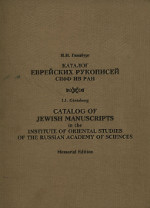|
|
| |

|

|
Гинцбург И.И. Каталог еврейских рукописей СПбФ ИВ РАН / Gintsburg I.I. Catalog of Jewish Manuscripts in the Institute of Oriental Studies. Memorial Edition. New York, Paris: Norman Ross Publishing Inc., 2003. ISBN 0-88354-276-5.
The work before you has suffered a tragic fate: its
author, Iona Iosifovich (Osipovich) Gintsburg, who
perished during the siege of Leningrad, spent his final
days preparing it for publication. He spent five years
(1936—1941) creating a systematic description of the
entire collection, as it existed at that time, which was
only possible due to his matchless abilities and
exhaustive knowledge of Jewish literature, the study
of which consumed his entire conscious life despite
the many barriers and difficulties he encountered
along the way (see Biography, below).
Gintsburg,s death, which occurred in Leningrad
during the most trying days of the siege, prevented
him from publishing what was to be his magnum opus.
Nonetheless, he did everything in his power to polish
the work and leave it in a state suitable for
publication.
The manuscript for this work (a typewritten text of
the catalog with Gintsburg’s interspersed handwritten
notes) made its way to the Orientalists’ Archive from
the estate of the deceased scholar, a fact attested to by
a note included in it by V.I. Belyaev. The manuscript,
estimated by the author to be some forty signatures
(quires?), fills eight large binders. Each of the first
three binders contains 1012 ־ signatures of original
manuscript, with subsequent binders containing one
half or one third as many. In the beginning of the
manuscript the author’s corrections pertain chiefly to
Oriental texts, of which there are relatively few in the
descriptive section. Beginning approximately halfway
through, Gintsburg’s manuscript is written entirely by
hand. All citations from texts in Oriental languages
were meticulously written out in his idiosyncratic
Ashkenazi cursive script. Since the manuscript was
created on poor quality paper, many of its pages have
become tattered or worn through and require delicate
handling. It is believed that there is but one copy of
the manuscript in existence. All of these
circumstances surrounding the work have affected its
preparation in one way or another.
In the 1960s K.B. Starkova and A.M. Gazov-
Ginzberg were assigned the task of finalizing the
manuscript for publication. They accomplished the
major task of preparing the heavily edited catalog text,
whose revision consisted of two parts, unequal in size,
content, and in their systems of entry descriptions. The
text encompassed works of artistic prose, poetry,
folklore and even works of natural science. For a
number of reasons primarily having to do with the
lack of interest in Jewish heritage in official Soviet
scholarship and publishing at the time, and also due
to the emigration of one of the authors, the work was
never to see the light of day. Moreover, the
completely corrected and press-ready manuscript
disappeared under mysterious circumstances after
being sent to the publisher in Moscow.
In the mid 1980s, a young Semitic Studies scholar,
I.F. Naftuliev, was asked to continue work on the
catalog. Naftuliev went back to the original Gintsburg
manuscript, retyped it and began preparing an index,
but soon left the Institute, without having had the time
to write out the necessary Hebrew texts by hand.
The administration of the St. Petersburg Branch of
the Institute of Oriental Studies continued its search
for a publisher. A copy of the manuscript was sent to
Hebrew Union College in New York, with whom a
preliminary agreement was reached to complete the
manuscript. Before long, however, the American
partners lost interest in the project.
Thus the editors of the present publication found
themselves with several versions of the text, none of
which reflected modem methods of Hebraic studies.
Meanwhile, interest in the collection among Russian
and foreign scholars alike had risen sharply since the
late 1980s. Under the direction of professor Malachi
Beit-Aria, the entire Hebraic Collection had been
preserved on microfilm as part of a joint project with
the Jewish National and University Library in
Jerusalem. (As a result, microfilms of the manuscripts
described in the present catalog are now held not only
in St. Petersburg, but also in Jerusalem.) Under the
circumstances, the administration of the St. Petersburg
Branch was also disposed to accept the proposal of
New York publisher Norman Ross to publish another
work from our archives—the manuscript of the
Gintsburg catalog, practically in the same form in
which it had come to us.
With the consent o f Norman Ross Publishing, B.I.
Zaikovsky of the Russian National Library, , was
engaged to prepare the book for press. Zaikovsky
undertook the painstaking correction of Gintsburg’s
manuscript (it was apparent from the beginning that
the conditions under which Gintsburg worked had
inevitably produced typographical and spelling errors).
In addition to Zaikovsky, work on this edition was
contributed by B.A. Melentsevich and G.A. Nyashin
(word processing of the Russian portion of the text),
S.A. Frantsuzov (word processing of the Hebrew),
O.B. Shakirov (page layout and design), and T.G.
Bulgakova (editing of the Russian text), each of whom
has done much to ensure that this manuscript has been
properly prepared for publication.
 PDF-files PDF-files
The entire catalogue
Keywords
Hebrew manuscripts
|
|
|
|
Random news: Announcements |
|
Preliminary defense of the dissertation for the degree of Doctor of Sciences in Philology by I.V. Bogdanov titled “Problems of studying the vocabulary of the Old Egyptian language: phraseology, titles, anthroponymy” will be held on January 26, 2024. |
|
Read more...
|
|
|
|
|

